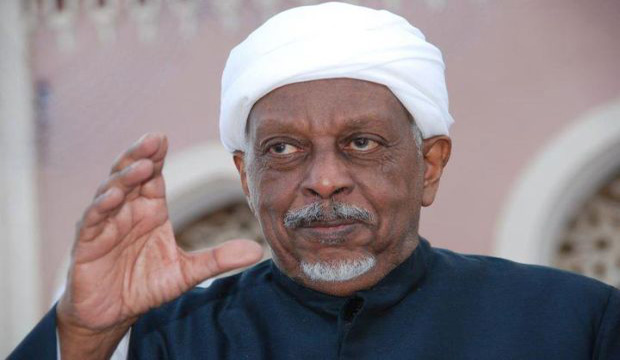
File photo of Sudan’s Democratic Unionist party leader Muhammad Othman Al-Mirghani. (Asharq Al-Awsat)
Khartoum, Asharq Al-Awsat—Sudan’s Democratic Unionist party leader Muhammad Othman Al-Mirghani called for comprehensive national dialogue on Tuesday, warning that the sub-Saharan African country could witness the “Libyan scenario” unless its divided political parties are able to come together.
Speaking to Asharq Al-Awsat, Mirghani said: “We need to accelerate a comprehensive Sudanese national dialogue without delay or obstruction . . . because the country is truly under threat. We do not want the country to be subject to the division, conflict and confrontation that we are seeing in other regional states such as Libya, Syria, Yemen and Iraq.”
“The Sudanese people must demonstrate strong willingness to converge and conduct constructive and positive national dialogue with the objective of saving Sudan and its people from all these threats and dangers,” he added.
Mirghani said that his Democratic Unionist party had called for dialogue as early as 2011, raising the issue to other Sudanese political parties as well as the Bashir government, but that this dialogue has been “delayed and adjourned without any compelling justification.”
Mirghani’s renewed calls for dialogue comes amid controversy over Sudanese president Omar Al-Bashir nominating himself for another term in office, seeking to extend his 25-year administration in next year’s general election. The move has been criticized by some Sudanese parties with leading Sudanese opposition figure Sadiq Al-Mahdi publicly calling on Wednesday for Bashir to step down. In comments to Reuters, Mahdi called on Bashir to step aside. “We as people who want change in Sudan look for a transition that would involve some kind of soft exit for him,” Mahdi told Reuters.
The International Criminal Court has issued warrants for Bashir’s arrest on charges relating to crimes against humanity, war crimes and genocide. The president’s uncertain legal status has resulted in political and economic isolation for Sudan, with many political parties inside the country unhappy about this ongoing state of affairs.
“If he [Bashir] becomes part of a solution, I think we can persuade all that he’s entitled to a different type of treatment . . .But if change comes in spite of his resistance . . .whoever comes to power will find it necessary to hand him over to the ICC,” Mahdi told Reuters.
Commenting on next year’s elections, Mirghani told Asharq Al-Awsat that his party expects to see “free and fair elections” and that the Democratic Unionist party will base its election campaign on the party’s “national heritage, historic roots and popular acceptance” as one of Sudan’s oldest and most-respected parties.
Speaking earlier this week, Bashir vowed to end Sudan’s international isolation following recent visits to Egypt and Saudi Arabia. “We promise you that Sudan will not be isolated, and our visit to Saudi Arabia removed doubts our trip to Egypt had returned matters to normal,” he said at the ruling National Congress Party’s conference after accepting his party’s nomination.
“Many bodies were counting on Sudan being isolated, but we are seeing an opening in our external relations,” he added.
